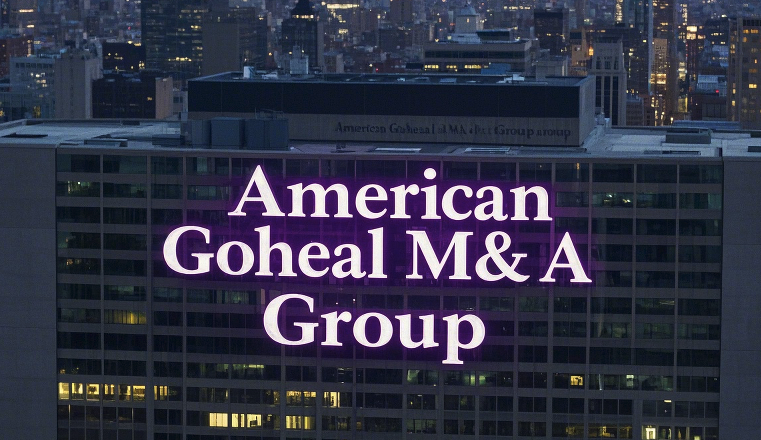"A slight mistake can lead to a huge error." In the capital market, this sentence is often more lethal than anywhere else. The acquisition of a controlling stake in a listed company may seem to be a game for capital giants, but the valuation logic cannot tolerate any mistakes. Once the scope of evaluation is wrong, the acquirer may pay a sky-high price, but buy an asset that is "golden outside, but rotten inside" - this is not only a loss of funds, but may also be the beginning of a triple blow of law, regulation, and market trust.

American Goheal M&A Group
The most typical example is the acquisition of GRAIL by Illumina. This case has almost become a textbook case of failed mergers and acquisitions. Illumina's valuation of GRAIL is far higher than the actual market value, and it has even been accused of misleading information. In the end, it not only triggered shareholder lawsuits, but was also cut off by regulators, causing Illumina's stock price to plummet and shareholders to suffer heavy losses. Goheal has found in his many years of practical experience in mergers and acquisitions that similar valuation errors are not isolated cases, but one of the most easily stepped on traps in controlling stake acquisitions.
So why are listed companies so prone to making mistakes in valuation ranges during mergers and acquisitions? The logic behind this is far more complicated than imagined.
"Optimistic illusion" and valuation bubble: psychological warfare before paying
Acquirers often like to believe in the "bright prospects" they see. When Illumina acquired GRAIL, it used two valuation forecasting models, one conservative version (Case A) and one optimistic version (Case B). But in the end, when they conveyed information to the market, they deliberately ignored the more pessimistic forecasts and chose a "modified" version. This psychological tactic is very common - management hopes to use market confidence to promote transactions, investment banks are willing to provide higher valuation support, and target companies are naturally happy to magnify their growth stories.
But the market is not a wishful game. Once the valuation bubble is punctured, the losses will be multiplied. Goheal found in past cases that truly smart buyers will not rely solely on the financial statements of the target company, but will combine industry data, market dynamics, and even consumer behavior analysis to calibrate the valuation range. Over-reliance on "beautified forecasts" will only make the acquirer a "takeover hero" in the market.
High premium: Is it really worth it, or is it an artificially created "highlight moment"?
Another reason for the distortion of the valuation range is the "high premium trap". In the case of Illumina, the final price of acquiring GRAIL was as high as US$10 billion, but subsequent analysis found that the real market value of GRAIL may be only about US$2.5 billion. The core reason for this valuation imbalance is that the acquirer's judgment on industry trends and market share is too based on short-term emotions rather than long-term value.
When analyzing M&A cases, Goheal found that high premiums are often not based on actual asset value, but on "future growth expectations" - but such expectations are often untenable. For example, an emerging biotech company may be overvalued because it is developing a revolutionary technology, but if the technology faces approval barriers or competitors go public first, the company's value may collapse instantly. If the acquirer ignores these variables and makes decisions based solely on market trends, it may pay a heavy price.
The "ruthless blow" of law and regulation
In the capital market, M&A transactions are not closed-door business, but are subject to strict scrutiny by regulators. Illumina's transaction was eventually blocked by the antitrust agency, one of the reasons being the information disclosure problem in the valuation. Every document and every prediction model in an M&A transaction may eventually become evidence in a lawsuit. If the acquirer conceals unfavorable information or misleads the market during the transaction, it will not only face the failure of the transaction, but also may be sued by shareholders for compensation for losses.

Goheal Group
Goheal believes that when a listed company acquires a controlling stake, it must not only conduct due diligence, but also ensure the transparency of the valuation process. In the current market environment, any concealment or misleading behavior will eventually be discovered by the market and will backfire on the acquirer in a more violent way.
Your opinion? Welcome to leave a message to discuss!
The acquisition of a controlling stake in a listed company is essentially a capital game, but if the valuation range deviates, this game may become a disaster. In your opinion, how to avoid valuation bubbles in the current market environment? Can AI and big data improve M&A evaluation? Can traditional financial analysis methods still adapt to the current capital market?
Welcome to leave a message in the comment area and discuss with Goheal how to avoid "value traps" in M&A transactions!
[About Goheal] Goheal is a leading investment holding company focusing on global mergers and acquisitions. It has deep roots in the three core business areas of acquisition of controlling rights of listed companies, mergers and acquisitions of listed companies, and capital operations of listed companies. With its profound professional strength and rich experience, it provides companies with full life cycle services from mergers and acquisitions to restructuring and capital operations, aiming to maximize corporate value and achieve long-term benefit growth.